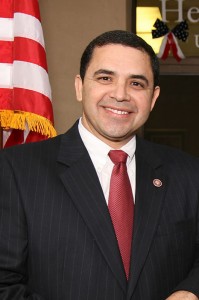CONGRESSMAN HENRY CUELLAR SUPPORTS CUTTING RED TAPE, VOTES FOR BILLS TO SPUR JOB CREATION
Written by Post Public Information Representative, Dec 3, 2011, 0 Comments
Courtesy Daniella Martinez,
 H.R. 527 and H.R. 3010 improves regulatory rule-making process and provides relief for Americans
H.R. 527 and H.R. 3010 improves regulatory rule-making process and provides relief for Americans
Washington, D.C. – Congressman Henry Cuellar (TX-28) announced the passage of H.R. 527, the Regulatory Flexibility Improvements Act and H.R. 3010, the Regulatory Accountability Act of 2011, which would reduce and streamline the process for government regulations to accelerate the economy by allowing job growth opportunities.
The House of Representatives passed H.R. 527 by a vote of 262 to 159 and H.R. 3010 by a vote of 253 to 167.
“As a former small business owner, I know the difficulties of conducting efficient business while dealing with heavy federal regulations,” said Congressman Cuellar. “At a time when our top priority in Congress should be job creation, these two pieces of deregulation legislation ease the burden on small businesses and in turn help boost job creation and help put Americans back to work.”
H.R. 527, the Regulatory Flexibility Improvement Act, amends a 30 year-old law by addressing the regulatory process. It requires assessing the economic impact of regulations before implementing and ensuring that indirect costs are also taken into account. Additionally, the legislation includes an assessment of rules that are duplicative, overlaps, or conflicts with other Federal rules to ensure an avoidance of over-regulation. A recent Small Business Administration study found that federal regulations impose an annual cost of $1.75 trillion dollars on the American economy which is 14 percent of the U.S. national income.
“We need to cut the bureaucratic, red tape that is stifling innovation and job growth,” said Congressman Cuellar. “Currently, up to 4,000 final federal rules are issued each year – improving the decision-making process and addressing overregulation in turn helps the country and especially main street.”
H.R. 3010, the Regulatory Accountability Act of 2011, is a bipartisan bill that lowers the cost of regulation, improves agencies’ decision-making process and enhances regulatory transparency and accountability. The bill modifies the federal rule-making process by requiring agencies to consider numerous criteria when issuing rules, including alternatives to rule proposals and potential costs and benefits.
In the past two Administrations, President Obama approved 614 federal rules within two years of his term, while President George W. Bush, at the same tenure, approved 643 federal rules – 4.7 percent more than the current Administration. According to the non-partisan U.S. Government Accountability Office, in the past year, the cost range of new regulations was estimated to be $8 billion, which is a decrease from 2010.



